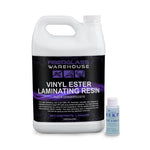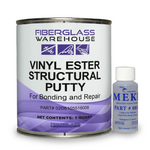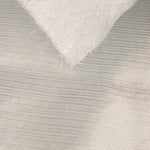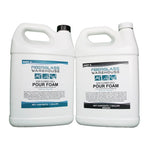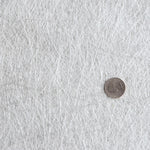You have no items in your shopping cart.
Milled Glass Fibers are your ultimate solution for enhancing the functionality and durability of resin-based projects. Expertly engineered from glass filaments coated with a specialized sizing, these fibers are designed to seamlessly blend with polyester, vinyl ester, and epoxy resins. Available in various lengths, including 1/4" and 1/32", milled fibers excel at adding strength, dimensional stability, and impact resistance. Whether you're improving surface hardness, filling gaps in fabric weaves, or creating a sag-resistant putty for vertical surfaces, this versatile material offers unmatched adaptability. Unlike chopped strands, milled fibers are processed to achieve a specified bulk density for consistent and superior performance. Ideal for professionals and DIY enthusiasts alike, Milled Glass Fibers will elevate your projects with enhanced bonding properties and precision. Always experiment on a small area before tackling larger applications to achieve optimal results!
Uses for Milled Glass Fibers:
-Boat construction and repair
-Molding, fabrication and repair of fiberglass laminates
-Fillet putty and thickening agent
-Used as an adhesive or putty
-Filling gaps
Features:
-Helps prevent sag or run off on vertical surfaces
-Can be used with other fillers such as glass bubbles and/or fumed silica
-Compatible with polyester, vinyl ester and epoxy resins
-Easy application
Needed Supplies When Working with Fillers:
-MEKP
-Stir Sticks
-Safety Protection including gloves, mask and eye goggles
Application:
-Work area and resin should be between 70°F and 85°F for best results.
-Make sure the work area is well ventilated and wear proper safety clothing including gloves and a face mask.
-Measure out the resin in measuring cup
-Add milled fibers until the desired consistency is created. Add a little bit at a time. Milled fibers are very fine and should be added slowly to avoid clumps. stir thoroughly, getting rid of any clumps that may arise.
-Multiple fillers can be added depending on what outcome is trying to be achieved. Glass bubbles are often added as well to help the putty sand easier.
-Add MEKP based on how much resin was used. MEKP catalyst is needed for polyester resin to cure. It should be added between 1-2% based on the volume of the resin. More or less than this will cause an improper cure. Cure time and pot life will vary depending on percentage of MEKP added and the temperature of the room. If 1% MEKP is added, there will be a longer pot life and it will cure slower than if 1.5% or 2% MEKP is added. Same goes for temperature. Lower temperatures result in a slower pot life/cure time than if working in higher temperatures.
-Apply the resin/milled fibers mixture to surface using a brush, spreader or squeegee
-Uncured polyester resin can be removed from tools and equipment with acetone.
Handling and Storage:
Closed containers should be stored in a cool, dry place. It should be stored at temperatures below 75°F and away from sunlight and heat sources.




